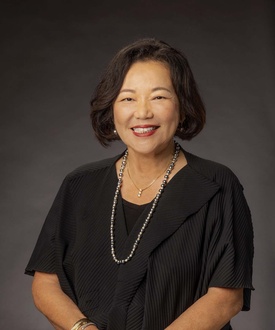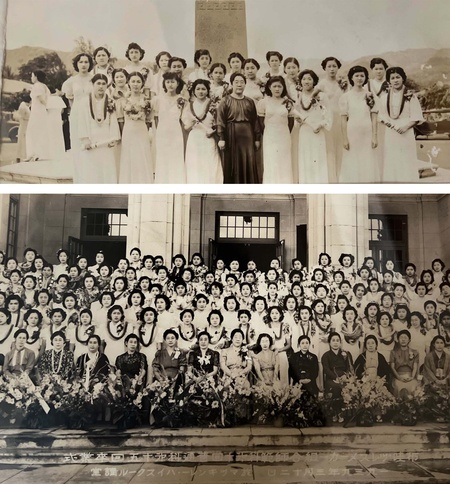Becoming a tour guide taking Japanese people to Japan
Apart from the Shin-Issei whose parents were born in Japan, I have hardly ever met a Sansei or later Japanese American who is fluent in Japanese. At the Japanese language school in Gardena that my children attended, a girl in my daughter's class was a Yonsei. Her father was Japanese and her mother was Taiwanese American. When I had a chat with her mother, she told me the following.
"I had assumed my husband could speak Japanese, but he doesn't understand it at all. So I thought I could leave it to him to help him with his Japanese school homework, but he's completely helpless. In the end, he always turns his homework in half-finished."
When I spoke to a third-generation Japanese father at his daughter's birthday party, he said, "I can't speak Japanese at all, so I'm sending my daughter to Japanese language school so that she can at least speak a little bit of Japanese." It seems that there are many Japanese parents who wish for the same thing.
However, there are also third-generation Japanese Americans who can speak Japanese fluently. In many cases, even if one parent is of Japanese descent, the other parent is from Japan, or has lived in Japan for a parent's work. Christine Kubota, a Hawaii-based lawyer who speaks fluent Japanese, is both.
Christine was born when her father, a second generation Japanese American, met a Japanese woman while he was in Japan working for the U.S. military. She was born in Yokohama and attended an international school called Sun Mall. She spoke English at school and with her father, but spoke Japanese with her mother. When she spoke with her sister, she was bilingual, and always spoke a mix of English and Japanese.
"Sometimes I wouldn't even know which language I was speaking (when I should be speaking English), and my sister would say to me, 'You, you're speaking Japanese now.'"
Christine, who spent her high school years in Yokohama, returned to Hawaii, her father's hometown, when she entered university. During her time at university, she began working as a tour guide, taking Japanese-Americans from Hawaii to Japan, making use of her bilingual skills.
"At that time, Japanese Americans loved going to mainland Las Vegas, and as someone born in Japan, I wanted them to see and enjoy Japan. Nowadays ramen is a common Japanese food and can be found in Hawaii, but even back then I would take them to (Japanese) ramen restaurants."
Becoming a lawyer to protect Japanese investors
After working as a tour guide, Christine began working as an interpreter, and it was during this job that she experienced a major turning point.
"There were many cases where people from Japan invested in Hawaii but were deceived, so an interpreter like me was needed between the English-speaking lawyers and the Japanese-speaking clients. I worked at law firms and courts, but when a Japanese client lost in court, I felt so frustrated that I once said to the lawyer, 'Why did you lose?' Then they said to me, 'Why don't you become a lawyer yourself?'"
Although she was already 30 years old, Christine was inspired to go to law school for the sake of Japanese investors, believing that the risk of being deceived would be reduced if there were experts they could consult with in Japanese at an early stage, rather than asking a lawyer after they had been deceived. "When Japanese people invest, they tend to completely trust the other party and say, 'I'll leave everything to you.' That's not right," she said. Born and raised in Japan, she was well aware of the characteristics of the Japanese people, and her spirit must have been such that she thought, "If I don't protect them, who will?"
The law school she went to was in Sacramento, California. It was a tough environment, with one-third of students dropping out by the end of their first year, and even for Christine, who had already graduated from college many years ago, studying law was extremely tough.
"But then one day, I had the chance to talk to a Japanese exchange student in the library. I was inspired by his dedication to studying at an American law school, even though English is not his native language." Christine had wanted to become a lawyer to help Japanese investors, but when she had a difficult time at law school, she was helped by the sincerity of a Japanese exchange student who was working hard.
After graduating from law school, she returned to Hawaii in 1988 and joined the law firm (now Damon Key Leong Kupchak Hastert), of which she is currently the representative, as a newcomer. "It was a time when female lawyers were still rare, so when I served coffee to the CEO of a client from Japan, he thought I was a secretary (not a lawyer) (laughs)."
As a lawyer, he has been handling everything for Japanese investors, from company establishment and license acquisition to visas, human resources and inheritance planning, and says he has been doing this for 35 years, with no fewer than 300 Japanese investor clients.
Wanting to help Japanese investors, Christine tried to become a lawyer at the age of 30 and actually made her dream come true. She started working as a tour guide during her university days, worked as an interpreter, and then became a lawyer. Currently, in addition to her work, she is also involved in the activities of many organizations in Hawaii, playing a role in connecting Japan and the United States both in her private and public life. Where does her power come from? Just as I was about to ask her, she finally shared her secret with me.
"Listen to the story of my paternal grandmother. She came to Hawaii from Hiroshima as a picture bride, studied dressmaking in Los Angeles, opened a dressmaking school in Hawaii and became a very successful business owner. She passed away before I was born, so I regret never having met her, but I definitely have the blood of that powerful grandmother flowing through my veins."
© 2023 Keiko Fukuda







